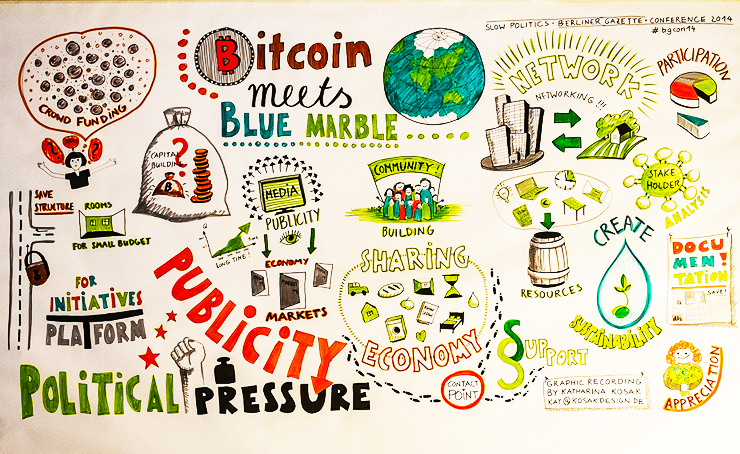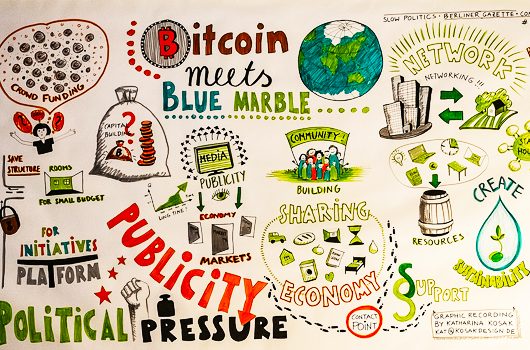Resultate des ‘Bitcoin meets Blue Marble’-Workshops bei der Berliner Gazette Jahreskonferenz SLOW POLITICS vom 13.-15.11. im SUPERMARKT.
PREFACE
This (incomplete) list aims at identifying support structures, tools and knowledge that can be of help for activists to get organized. This list addresses all sorts of civic movements, individual activists, temporary groups of interests, as well as activist organizations. With this list, we focus on the most urgent tactics and resources which we have commonly identified over the two workshop days. However, we are aware that this list is far from being complete. We therefore encourage everyone to take this document as a starting point and to amend and complement it where they see it appropriate. The paper was drafted at the workshop “Bitcoin Meets Blue Marble”.
SPACES
• Spaces are more than just physical resources. They are very important in an increasingly gentrified urban environment.
• We need an overview of the various spaces, their specific know-how, collaborative practices and activities in general.
• We need open, unregulated spaces (outside of the realm of state controlled “creative hubs” or corporate “fablabs”.)
• We need a common financial strategy to keep these spaces alive.
• Spaces provide raw data about work- and life conditions of freelancers and creative producers. Gathering and visualizing data is an important step towards political
representation.
• We’d like to promote the idea of an exchange program for civil servants, policy makers and representatives of various lobby groups to work (at least temporarily)
from a co-working space.
• We’d like to see the rise of an independent bureau or “embassy” which represent a multitude of citizen movements as a trusted gateway into politics, administration and economic lobbies. This independent bureau would have the mandate to speak on behalf of activist groups and it should provide the following resources: neutral
ground for negotiations, communication support, legal advice, as well as consultants for tax and founding models.
• The formats which have been developed in community-spaces will enter one day into mainstream culture
A MANIFESTO ON COMMON VALUES
Activist groups, as diverse as they are, should consider assessing a basic set of values that they can share among the different scenes. We can look at it as a common denominator which helps shaping the narrative of values that all these groups have in common. A value catalogue is also an important reference in situations of conflicts and uncertainty within a movement or group.
The Manifesto on common values should especially focus on:
• Common goals and themes
• Cultural, creative and economic practices which are supported
• Standards for ownership questions, participation, agency-building
• Knowledge transfer between different groups of practice
• Practices of conflict solving
• Drawing up an inventory of social values that everyone can adhere to, just as diversity, well-being, health (to name but a few…)
FINANCIAL STRATEGIES
Activist groups usually reside outside of banking norms and financial standards. So it’s difficult to access state support, bank loans or sponsorship. Actions of activist groups are mostly based on donations, funding programs or cross-financing models of the activists themselves. However, new transactional practices such as community currencies, crowd-investment or bartering-and sharing principles are on the rise. We envision an independent organize that would be able to provide both access to project funds and / or consultations on other financial self-help models. This organization should be organized by people with a profound understanding of economic and financial structures.
STAKEHOLDER ANALYSIS
No matter whether we talk about the creative production sector, the freelancers / self-employed or activist organizations – nearly everywhere statists lack. Existing figures are frequently incomplete or biased and they often fail in providing a clear idea of life and work conditions of activists. We believe that stakeholder analysis, as well as self-organized data assessment along with data visualization would help to increase the profile of many activist movements. Only with the backup
of numbers, figures and statistics, alternative activist groups can become ready to enter the political stage. This also means that activists should be in control of their own data. They must know about their stakeholders and their work conditions, before other parties start to educate them on this.
LEGAL ADVICE
We have mentioned this already as part of “spaces”, but since the topic is so important it might as well get its own position on this list. Legal advice is priceless for those who are in need of it, but yet very expensive and sometimes even not accessible for many people. We envision a database of lawyers and people who are able to give legal advice outside of the regular payment frameworks.
STRATEGIES OF PARTICIPATION
Most of us are not trained in strategies of political participation and / or tactics. There is still a lot we can learn here, especially with regards to negotiations with state bodies, policy makers or other groups. We should have a profound understanding of agency, representation and participation and should help each other in becoming masters of this game. We envision an online platform with best practice cases, a forum to exchange ideas as well as a section for practical advice and experts we can address. And of course regular physical meet-ups where people can start training each other.
STRATEGIES OF KNOWLEDGE- AND SKILL TRANSFER
Working in mostly undefined groups of practice also means to acknowledge the fact that we need certain regulations how to deal with the knowledge that emerges within a community. Who owns the knowledge? Who can act and talk on behalf of a group of practice, re-using and spreading knowledge? How can we make sure that skills and knowledge are equally accessible to each member of the group? This is one of the most challenging factors. Collaborative workspaces are breeding places for new forms of production and practices, such as hackathons and book sprints. What to do with the results of such common endeavors? In many cases, these practices get co-opted
and are being implemented into corporate environments. How to claim ownership or authorship then?
SAFE COMMUNICATION STRUCTURES
Activists need to be sure that they can speak openly, without fearing that someone else will try to track them down. We need to spread already existing toolkits about online security, organize crypto parties and workshops with experts in order to make sure that activists make the full use of online security tools and strategies.
A STRONG COMMON NARRATIVE
Let’s tell the story in a different way! Let’s implement a common narrative that is strong enough to find its way into mainstream culture! Let’s work on creative campaigns, flash mobs and public storytelling tactics that reach people’s minds and hearts.
Results of the ‘Bitcoin meets Blue Marble’-Workshops within the Berliner Gazette annual conference SLOW POLITICS from 13.-15.11. in SUPERMARKT.
PREFACE
This (incomplete) list aims at identifying support structures, tools and knowledge that can be of help for activists to get organized. This list addresses all sorts of civic movements, individual activists, temporary groups of interests, as well as activist organizations. With this list, we focus on the most urgent tactics and resources which we have commonly identified over the two workshop days. However, we are aware that this list is far from being complete. We therefore encourage everyone to take this document as a starting point and to amend and complement it where they see it appropriate. The paper was drafted at the workshop “Bitcoin Meets Blue Marble”.
SPACES
• Spaces are more than just physical resources. They are very important in an increasingly gentrified urban environment.
• We need an overview of the various spaces, their specific know-how, collaborative practices and activities in general.
• We need open, unregulated spaces (outside of the realm of state controlled “creative hubs” or corporate “fablabs”.)
• We need a common financial strategy to keep these spaces alive.
• Spaces provide raw data about work- and life conditions of freelancers and creative producers. Gathering and visualizing data is an important step towards political
representation.
• We’d like to promote the idea of an exchange program for civil servants, policy makers and representatives of various lobby groups to work (at least temporarily)
from a co-working space.
• We’d like to see the rise of an independent bureau or “embassy” which represent a multitude of citizen movements as a trusted gateway into politics, administration and economic lobbies. This independent bureau would have the mandate to speak on behalf of activist groups and it should provide the following resources: neutral
ground for negotiations, communication support, legal advice, as well as consultants for tax and founding models.
• The formats which have been developed in community-spaces will enter one day into mainstream culture
A MANIFESTO ON COMMON VALUES
Activist groups, as diverse as they are, should consider assessing a basic set of values that they can share among the different scenes. We can look at it as a common denominator which helps shaping the narrative of values that all these groups have in common. A value catalogue is also an important reference in situations of conflicts and uncertainty within a movement or group.
The Manifesto on common values should especially focus on:
• Common goals and themes
• Cultural, creative and economic practices which are supported
• Standards for ownership questions, participation, agency-building
• Knowledge transfer between different groups of practice
• Practices of conflict solving
• Drawing up an inventory of social values that everyone can adhere to, just as diversity, well-being, health (to name but a few…)
FINANCIAL STRATEGIES
Activist groups usually reside outside of banking norms and financial standards. So it’s difficult to access state support, bank loans or sponsorship. Actions of activist groups are mostly based on donations, funding programs or cross-financing models of the activists themselves. However, new transactional practices such as community currencies, crowd-investment or bartering-and sharing principles are on the rise. We envision an independent organize that would be able to provide both access to project funds and / or consultations on other financial self-help models. This organization should be organized by people with a profound understanding of economic and financial structures.
STAKEHOLDER ANALYSIS
No matter whether we talk about the creative production sector, the freelancers / self-employed or activist organizations – nearly everywhere statists lack. Existing figures are frequently incomplete or biased and they often fail in providing a clear idea of life and work conditions of activists. We believe that stakeholder analysis, as well as self-organized data assessment along with data visualization would help to increase the profile of many activist movements. Only with the backup
of numbers, figures and statistics, alternative activist groups can become ready to enter the political stage. This also means that activists should be in control of their own data. They must know about their stakeholders and their work conditions, before other parties start to educate them on this.
LEGAL ADVICE
We have mentioned this already as part of “spaces”, but since the topic is so important it might as well get its own position on this list. Legal advice is priceless for those who are in need of it, but yet very expensive and sometimes even not accessible for many people. We envision a database of lawyers and people who are able to give legal advice outside of the regular payment frameworks.
STRATEGIES OF PARTICIPATION
Most of us are not trained in strategies of political participation and / or tactics. There is still a lot we can learn here, especially with regards to negotiations with state bodies, policy makers or other groups. We should have a profound understanding of agency, representation and participation and should help each other in becoming masters of this game. We envision an online platform with best practice cases, a forum to exchange ideas as well as a section for practical advice and experts we can address. And of course regular physical meet-ups where people can start training each other.
STRATEGIES OF KNOWLEDGE- AND SKILL TRANSFER
Working in mostly undefined groups of practice also means to acknowledge the fact that we need certain regulations how to deal with the knowledge that emerges within a community. Who owns the knowledge? Who can act and talk on behalf of a group of practice, re-using and spreading knowledge? How can we make sure that skills and knowledge are equally accessible to each member of the group? This is one of the most challenging factors. Collaborative workspaces are breeding places for new forms of production and practices, such as hackathons and book sprints. What to do with the results of such common endeavors? In many cases, these practices get co-opted
and are being implemented into corporate environments. How to claim ownership or authorship then?
SAFE COMMUNICATION STRUCTURES
Activists need to be sure that they can speak openly, without fearing that someone else will try to track them down. We need to spread already existing toolkits about online security, organize crypto parties and workshops with experts in order to make sure that activists make the full use of online security tools and strategies.
A STRONG COMMON NARRATIVE
Let’s tell the story in a different way! Let’s implement a common narrative that is strong enough to find its way into mainstream culture! Let’s work on creative campaigns, flash mobs and public storytelling tactics that reach people’s minds and hearts.

